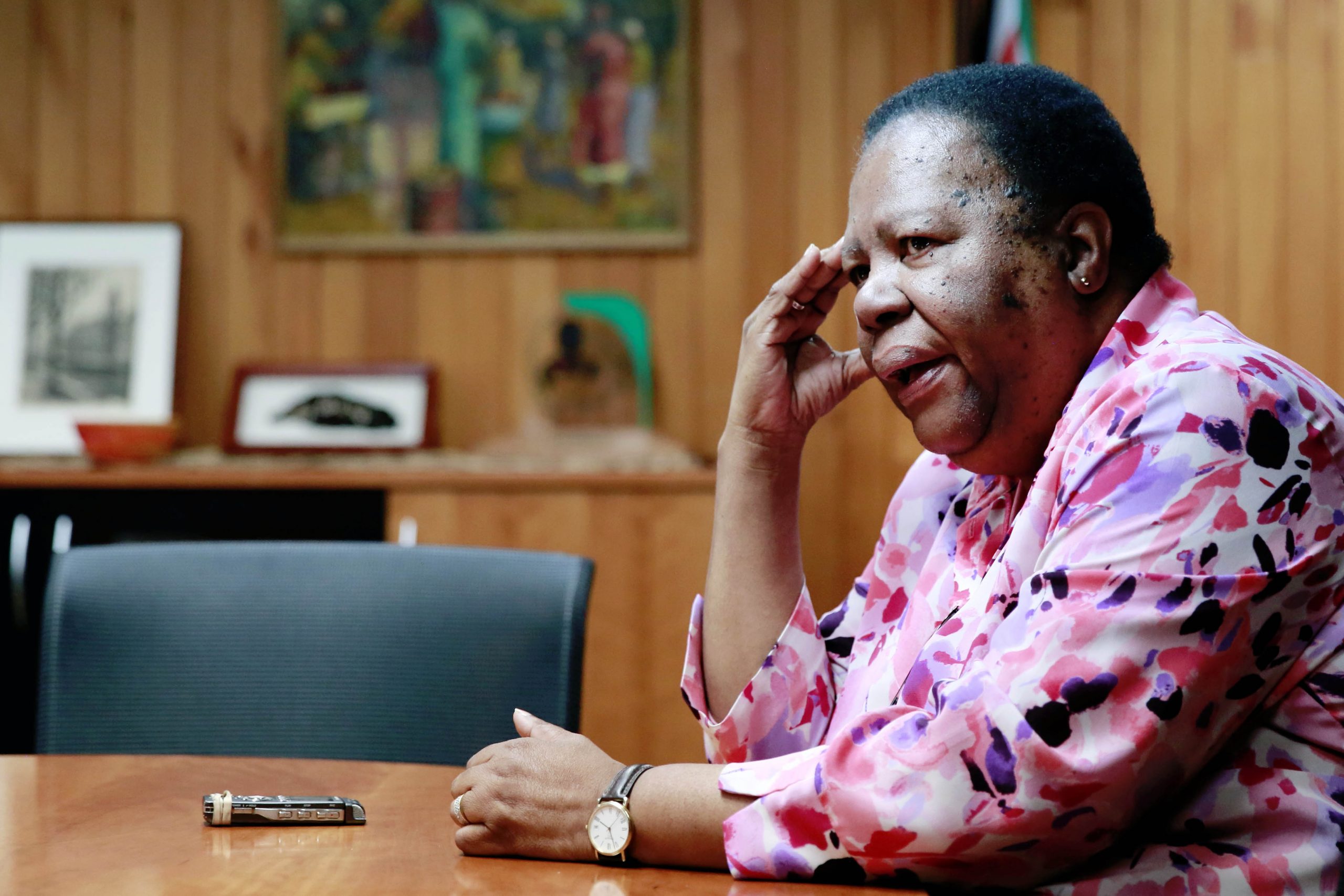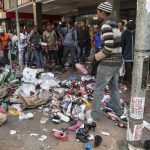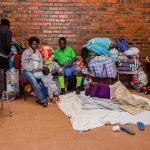Xenophobia denialists should be held culpable
By insisting that the recent spate of violence in South Africa was ‘just crime’ and that migrants are to blame for the country’s ills, politicians and commentators spread the hate that sparks pogro…
Author:
19 September 2019

After two weeks of xenophobic violence in which 12 people were killed, the South African government and much of the political elite have again denied that the violence was xenophobic, maintaining a stance employed after the worst outbreak of xenophobic violence in May 2008.
Former president Thabo Mbeki infamously denied that the violence then was xenophobic, insisting it was “naked criminal activity”. More than 60 people were killed in what many described at the time as “pogroms”. But Mbeki, who has a sorry history of denialism, said: “What happened during those days was not inspired by possessed nationalism, or extreme chauvinism, resulting in our communities violently expressing the hitherto unknown sentiments of mass and mindless hatred of foreigners – xenophobia.”
Xenowatch, which monitors xenophobic attacks in South Africa, has collected data on more than 300 xenophobic murders since 2006, but cautioned that the numbers were likely much higher because of under-reporting.
Following the latest outbreak of xenophobic violence in the first two weeks of September 2019, ministers and other politicians toed the same line – the violence wasn’t xenophobic but mere criminality. This despite copious evidence that the people organising and carrying out the violence have explicitly presented their actions in xenophobic terms.
Related article:
Minister of Defence and Military Veterans Nosiviwe Mapisa-Nqakula insisted the violence wasn’t xenophobic after she briefed the justice and security cluster ministers in Parliament following the 12 murders. “South Africa is not a xenophobic country,” she insisted.
Mapisa-Nqakula said 10 of the 12 people killed during the latest xenophobic attacks were South Africans, and many commentators and politicians latched on to this as evidence that the violence wasn’t xenophobic but “random acts of crime”.
The South Africans and migrants killed
When looking at the circumstances in which some of the South Africans were killed, it becomes evident that they were killed in direct acts of xenophobic violence. Karabo Ditire and Isaac Sebaku were shot and killed by migrant shop owners whose shops in Coronationville, west of Johannesburg, were under attack from a mob.
Some community members said Sebaku was part of the mob attacking the shop owner, but Sebaku’s sister, Precious, denied that her brother was involved in any looting. She said he was a bystander who was caught in the crossfire. Ditire died in similar circumstances.
Another South African man was killed in KwaThema in Ekurhuleni. He was shot by a landlord who was trying to protect his tenant and the tenant’s shop from a mob that was looting migrant-owned shops in the area. The tenant was a migrant.
George “Sung Sung” Kwachana was killed by a mob in Katlehong, southeast of Johannesburg, while trying to protect a Shangaan-speaking woman from a mob that had been going around destroying shacks owned by migrants and South Africans alike. His brother, Benny, said Kwachana was a former soldier trying to do the right thing and protect an innocent woman.
The circumstances in which migrants were murdered were even more horrific. Isaac Sithole, a 35-year-old Zimbabwean man killed in Katlehong, was beaten and set alight by a mob. Two other people were torched beyond recognition in Alexandra, north of Johannesburg. The South African Police Service said it has yet to identify them.
Blaming the reporters
Despite this evidence, the political elite has continued with its persistent denialism and pervasive normalisation of xenophobic statements. Minister of International Relations and Cooperation Naledi Pandor went so far as to blame the media for painting South Africa and South Africans as xenophobic.
Pandor said in a briefing to journalists in Tshwane ahead of next week’s United Nations General Assembly: “I think it is SA media that is depicting SA as xenophobic because SA media is very keen to keep this impression alive.
“I would urge the media of SA to help us and start sending a different message to the people of the world, as well as to our own people, to convey the message that we welcome all to our country, and that the events that occurred were events that none of us regard as to be tolerated, and we believe were a shame to our nation.
“I note the resistance of the media, even when respected actors in matters of human rights have said it is wrong to call SA xenophobic. The events that have happened are of concern, but maintaining this notion, which the media seems intent to do, is a problem for us.”
The role of the media
In many instances the media, and some commentators, should be criticised for their role in the normalisation of xenophobic rhetoric by pushing the government’s line of trying to deflect the problem by calling it crime.
Those insisting that the violence is solely a matter of Afrophobia rather than xenophobia are erasing the horrors and experiences of Bangladeshi, Pakistani and other Asian migrants. Writers who push the narrative that it is “only crime” fall into what journalist and academic Vijay Prashad calls acting as “stenographers for the state” rather than as journalists.
Those acting in the interests of the state republish blatant lies and misinformation spread by politicians without attempting to gather their own facts. The media has often been guilty of republishing statements by politicians trying to shy away from acknowledging that xenophobia was at the heart of the violence without interrogating or questioning them.
Most shocking have been the grossly xenophobic statements and opinion pieces published by national media. Modidima Mannya, an advocate, writer and academic, recently published a piece in the City Press newspaper. In it, he repeated some of the already debunked lies and myths about migrants in South Africa, while making further disparaging comments about migrants.
Related article:
“It cannot be unreasonable for South Africans to demand that foreign nationals not take their jobs, overcrowd their hospitals, benefit from their social housing policy or get social grants,” Mannya wrote.
His statements about migrants stealing jobs and benefitting from housing and social grants, as well as their roles in the proliferation of drugs and the overcrowding of state hospitals, have all been debunked and proved to be false, yet the piece was still published.
Selby Mokgotho, an advocate and member of the Polokwane Society of Advocates, also wrote an opinion piece for City Press calling for stricter immigration policies. “The undocumented number of foreign nationals in the country and the illegal methods they use to enter South Africa is depressing,” he wrote.
“Last week, Police Minister Bheki Cele released the worrying crime statistics which shows an increase in crime. Although Cele did not provide any nexus with the current developments, the situation, however, cannot be read in isolation. South Africans did not wake up one day and found that the foreign nationals were the problem.”
Mokgotho is as guilty as any one of the number of politicians and commentators trying to blame migrants for the government’s failure to address unemployment, inequality, housing and rising crime levels in South Africa.
What migrants contribute
While these politicians and commentators have been allowed to spread lies, debunked myths and misinformation about migrants in South Africa, the Helen Suzman Foundation published a report on migration in South Africa.
Using Statistics South Africa figures, the report shows that in 2017, migrants made up about 5.3% of the total workforce in South Africa. “It was concluded further that the presence of ‘new’ immigrants, who have been in South Africa for less than 10 years, increases both the employment rate and the incomes of local workers,” the report said. Not only does this refute the allegation that migrants steal South Africans’ jobs, but the report found that they contribute positively to the economy.
“With respect to public finance, immigrants have a positive net impact on the government’s fiscal balance. This is because they pay more taxes than locals (income and value added), disproving the assumption that immigrants generate high costs for the public sector (migration policy and implementation, social grants, health care, etc) without generating similar tax revenues,” says the Helen Suzman Foundation report.
It further found that migrants have about a 30% share of the informal economy. Instead of the populist line that migrants are stealing jobs, they are actually creating their own opportunities and, in many cases, employing South Africans.
Related article:
“Moreover, the evidence suggests that immigrants do not necessarily compete for the same jobs as South Africans. This is in line with South Africa’s critical skills-based immigration policies, but also the ‘backdoor’ phenomenon, by which immigrants are allowed to enter to fill informal sector or low-skilled jobs, but only on a temporary basis and with little job protection,” the report says.
“It is the nature of xenophobia, and the insecurity at work beneath it, to vilify the ‘other’. In South Africa, immigrants are constructed as a burden to society with respect to security, jobs and welfare. Their positive contributions to the fiscus, economic growth and per capita income are understated and their contribution to crime appears to have been seriously overstated,” the report concluded.
But because this doesn’t suit the narrative of unscrupulous politicians who have failed at their mandates, it will almost certainly be ignored. It is more convenient for Johannesburg mayor Herman Mashaba, who recently refused to apologise for the violence in Johannesburg, to blame migrants for his administration’s failure to boost the local economy or fight crime in the city.
These politicians should be held accountable. Over the past year they have been allowed to repeatedly make grossly xenophobic statements without repercussion. The media has also been complicit in the normalisation of xenophobia by publishing obviously xenophobic opinion pieces and articles littered with debunked and discredited claims about migrants. By continuously misleading the public, and denying the existence and extent of xenophobia in South Africa, we will never address the root causes of our increasingly serious problems.



